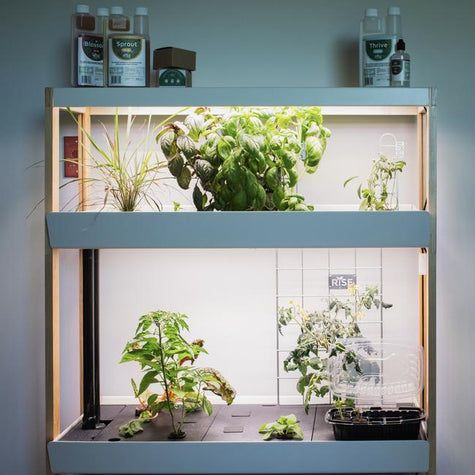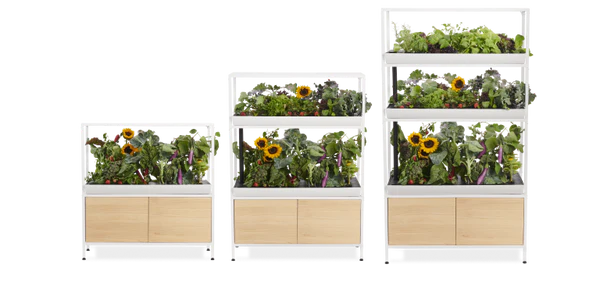You’ve probably come across the word “organic” when shopping in the aisles of your local grocery store. You may have even bought organic produce for yourself in the past. But what does the “organic” label really mean? In this article, we will discuss what organic means, what organic nutrients are, and if your Rise Garden can be organic.
What is organic?
To begin, most hydroponic nutrients are not organic. Sad, we know. What makes food, beverages, and products labeled as USDA organic is a variety of qualifications that need to be met. For one, produce must be grown on soil that had no prohibited substances applied for three years prior to harvest. Such substances include most synthetic fertilizers and pesticides. In some cases a farmer can use a synthetic substance but it must be to achieve a specific purpose and it must be approved according to a strict list of health and environmental criteria.
Second, the use of genetic engineering, or genetically modified organisms (GMOs), is prohibited in organic products. Farmers and processors must show they aren’t using GMOs and that they are protecting their products from contact with prohibited substances, from farm to table. These requirements are to make sure both you and the environment are protected.
Organic hydroponic nutrients are made up of organic material (this means fermented food waste or filtered animal byproduct) that is then concentrated into a liquid that can be added into hydroponic systems. One downfall of this method is that the availability and consistency of nutrients is not nearly enough compared to its non-organic counterparts.
So why choose organic?
Some reasons to choose to grow your plants with organic nutrients are to eat produce grown entirely without synthetics and for less maintenance over time as microbes continue producing nutrients. For a plant to access that nutrition with organic nutrients, bacteria, aka the “middle-man”, have to first digest the nutrients being added into gardening systems. The key for making nutrients available is ensuring there is microbial activity around the plant’s root zone; aerobic (oxygenated) digestion by bacteria is how plants uptake nutrients. This process is continuous even after the addition of nutrients into the system.
What about Rise Gardens nutrients?
The way our nutrients work can be compared to how a plant reacts to nutrients in soil as it grows. A plant in soil first has its roots near the surface as that’s where the “Thrive” nutrients are. But as the plant matures, it needs to access “Sprout” or “Blossom” nutrients. To do this, the plant elongates its roots and extends them further down into the soil.
Producing organic ingredients requires specific bacteria to digest that byproduct for the growing plants to be able to uptake the nutrients. Without that biome, or too little of it, it results in a very smelly garden.
Rise Gardens does not use organic nutrients, but rest assured that our nutrients do not come with the inconsistencies or unpleasant smells that organic nutrients may sometimes contain. Organic nutrients may also increase the risk of unwanted pests making a home on your produce given the excess organic material breaking down. These were two factors we weighed heavily in our decision to produce non-organic plant nutrients.
Depending on what you are looking for in your gardening experience, each gardener will weigh the benefits and costs of organic hydroponics differently. While our nutrients are not considered organic, rest assured that the plants you grow are free from pesticides and other contaminants. When plants are grown in your own home, you control what goes in and on your plants. Happy growing!
This blog post was authored by Lamija Memidzan, a member of our plant science team.

